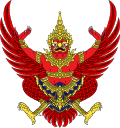| | |||||||||||||
| |||||||||||||
91 of the 182 seats in the House of Representatives | |||||||||||||
| Turnout | 40.22% ( | ||||||||||||
|---|---|---|---|---|---|---|---|---|---|---|---|---|---|
This lists parties that won seats. See the complete results below.
| |||||||||||||
 |
|---|
| |
General elections were held in Siam on 7 November 1937 to elect 91 members of the 182-seat House of Representatives, with the other 91 appointed by King Ananda Mahidol. Unlike the 1933 elections, which had been carried out on an indirect basis, the 1937 elections were direct.
At the time there were no political parties, [1] so all candidates ran as independents. Voter turnout was 40%. [2]
